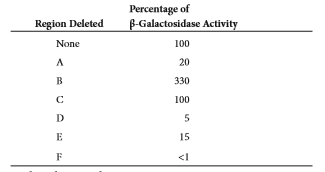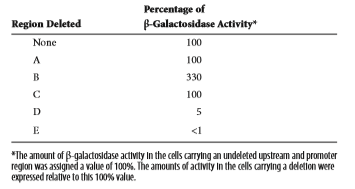
Genetics: Analysis and Principles 5th Edition by Robert Brooker
Edition 5ISBN: 978-0073525341
Genetics: Analysis and Principles 5th Edition by Robert Brooker
Edition 5ISBN: 978-0073525341 Exercise 1
You will need to understand solved problem S4 before answering this question. A muscle-specific gene was cloned and then subjected to promoter bashing. As shown here, six regions, labeled A-F, were deleted, and then the DNA was transformed into muscle cells. 
a.
The data shown here are from this experiment.
a.
Explain these results.Problem S4
A common approach to identify genetic sequences that play a role in the transcriptional regulation of a gene is the strategy sometimes called promoter bashing. This approach requires gene cloning methods, which are described in Chapter 20. A clone is obtained that has the coding region for a protein-encoding gene as well as the region that is upstream from the core promoter. This upstream region is likely to contain genetic regulatory elements such as enhancers and silencers. The diagram shown here depicts a cloned DNA region that contains the upstream region, the core promoter, and the coding sequence for a protein that is expressed in human liver cells. The upstream region may be several thousand base pairs in length.
a.
To determine if promoter bashing has an effect on transcription, it is helpful to have an easy way to measure the level of gene expression. One way to accomplish this is to swap the coding sequence of the gene of interest with the coding sequence of another gene. For, example, the coding sequence of the lacZ gene, which encodes -galactosidase, is frequently swapped because it is easy to measure the activity of -galactosidase using an assay for its enzymatic activity. The lacZ gene is called a "reporter gene" because its activity is easy to measure. As shown here, the coding sequence of the lacZ gene has been swapped with the coding sequence of the liver- specific gene. In this new genetic construct, the expression and transcriptional regulation of the lacZ gene are under the control of the core promoter and upstream region of the liver-specific gene.
a.
Now comes the "bashing" part of the experiment. Different segments of the upstream region are deleted, and then the DNA is transformed into living cells. In this case, the researcher would probably transform the DNA into liver cells, because those are the cells where the gene is normally expressed. The last step is to measure the -galactosidase activity in the transformed liver cells.In the diagram shown here, the upstream region and the core promoter have been divided into five regions, labeled A-E.
a.
One of these regions was deleted (i.e., bashed out), and the rest of the DNA segment was transformed into liver cells. The data shown here are from this experiment.
a.
Explain what these results mean.

a.
The data shown here are from this experiment.

a.
Explain these results.Problem S4
A common approach to identify genetic sequences that play a role in the transcriptional regulation of a gene is the strategy sometimes called promoter bashing. This approach requires gene cloning methods, which are described in Chapter 20. A clone is obtained that has the coding region for a protein-encoding gene as well as the region that is upstream from the core promoter. This upstream region is likely to contain genetic regulatory elements such as enhancers and silencers. The diagram shown here depicts a cloned DNA region that contains the upstream region, the core promoter, and the coding sequence for a protein that is expressed in human liver cells. The upstream region may be several thousand base pairs in length.

a.
To determine if promoter bashing has an effect on transcription, it is helpful to have an easy way to measure the level of gene expression. One way to accomplish this is to swap the coding sequence of the gene of interest with the coding sequence of another gene. For, example, the coding sequence of the lacZ gene, which encodes -galactosidase, is frequently swapped because it is easy to measure the activity of -galactosidase using an assay for its enzymatic activity. The lacZ gene is called a "reporter gene" because its activity is easy to measure. As shown here, the coding sequence of the lacZ gene has been swapped with the coding sequence of the liver- specific gene. In this new genetic construct, the expression and transcriptional regulation of the lacZ gene are under the control of the core promoter and upstream region of the liver-specific gene.

a.
Now comes the "bashing" part of the experiment. Different segments of the upstream region are deleted, and then the DNA is transformed into living cells. In this case, the researcher would probably transform the DNA into liver cells, because those are the cells where the gene is normally expressed. The last step is to measure the -galactosidase activity in the transformed liver cells.In the diagram shown here, the upstream region and the core promoter have been divided into five regions, labeled A-E.

a.
One of these regions was deleted (i.e., bashed out), and the rest of the DNA segment was transformed into liver cells. The data shown here are from this experiment.

a.
Explain what these results mean.
Explanation
The region A, D and E contains enhancers...
Genetics: Analysis and Principles 5th Edition by Robert Brooker
Why don’t you like this exercise?
Other Minimum 8 character and maximum 255 character
Character 255



